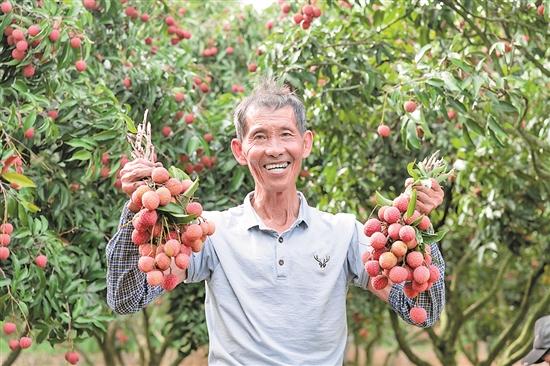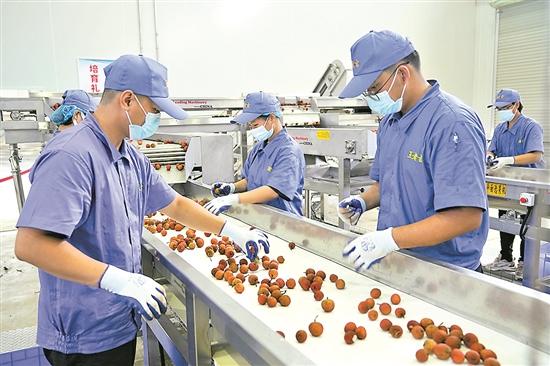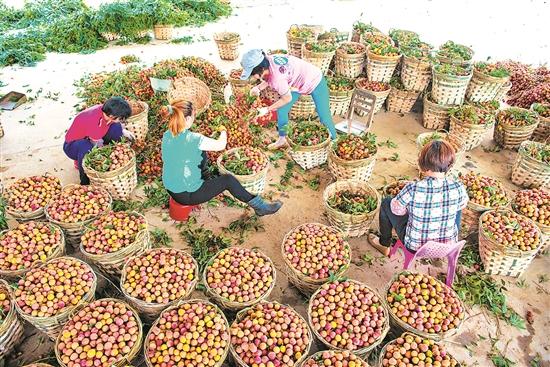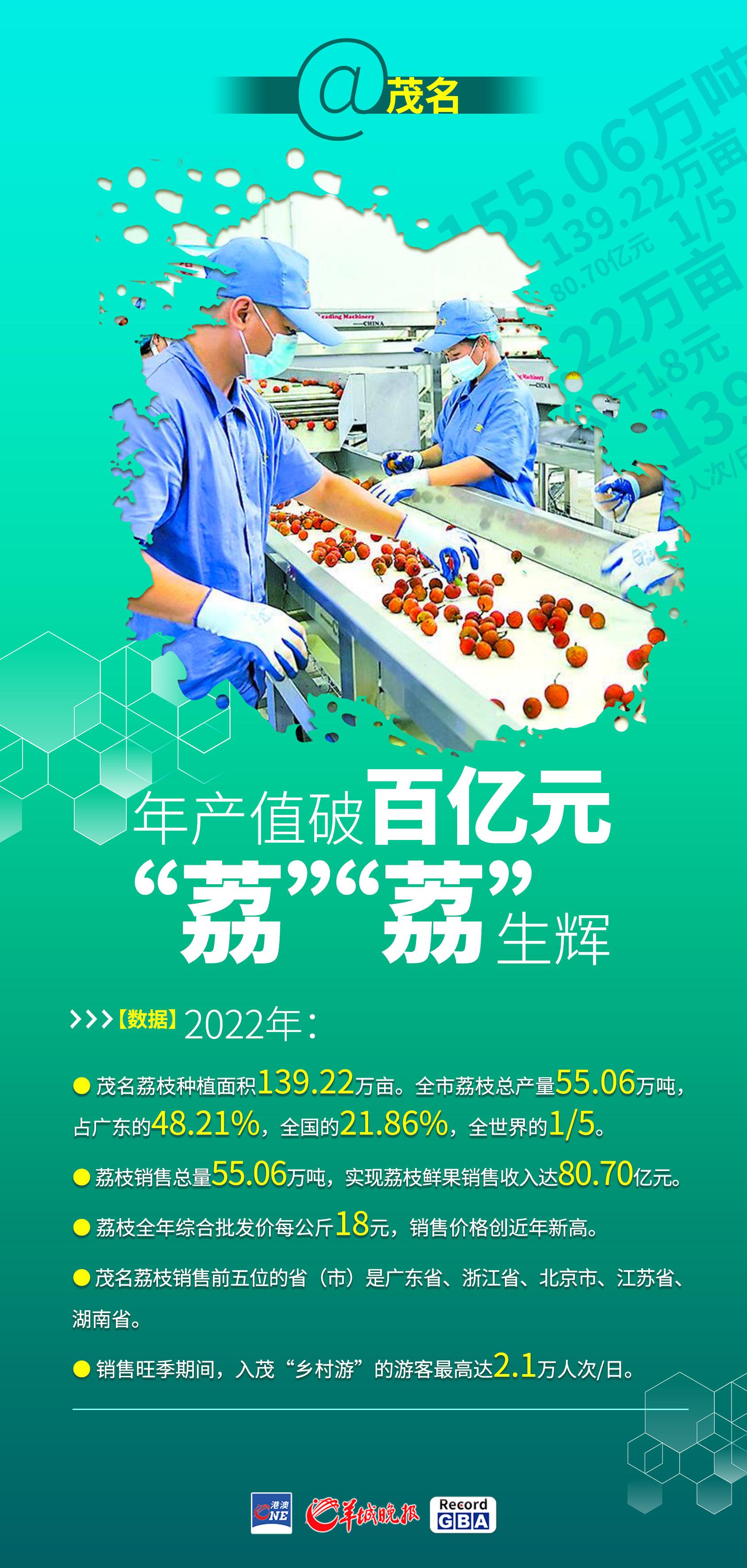Xi Jinping, general secretary of the Communist Party of China Central Committee, on Tuesday inspected the city of Maoming, south China's Guangdong Province.
Xi went to a village in Genzi Township, Gaozhou City of Maoming.
At the village, Xi visited a lychee orchard and a longan and lychee cooperative to learn about local efforts to develop distinctive planting industry and advance rural revitalization.
Maoming, located in Guangdong Province, China, is the world's largest lychee production base. In recent years, the entire industry chain of lychee production in Maoming has achieved an output value of over 10 billion yuan, becoming an important pillar industry for promoting the prosperity of local villages.
On April 12th, reporters from Yangcheng Evening News discovered in Gaozhou that measures such as optimizing the variety structure of lychee, protecting ancient trees to enhance cultural branding, improving delivery services, and extending the industry chain have become the secrets to driving the production value of lychee to over 10 billion yuan. Maoming will continue to focus on the "four cards" of industry, market, technology, and culture, to promote the high-quality development of the lychee industry and ensure long-term stability and prosperity.

Preserving ancient trees and telling their stories
The Genzi Baqiao Plantation in Maoming was built during the Sui and Tang Dynasties (about 1300 years ago) and is currently one of the largest and most well-preserved ancient lychee gardens in the country. Praised as the "Lychee Museum", it is one of the ancient lychee orchards with the greatest number of ancient lychee trees and the most complete variety of lychee species. It boasts 180 ancient lychee trees, including nine over a thousand years old and 39 over 500 years old. Currently, Maoming has over 350 lychee trees with a lifespan over a thousand years, over 1000 trees with a lifespan over 500 years, and 19,400 trees with a lifespan over 100 years.
Using historical and cultural elements to empower lychee, Maoming has developed an effective approach to make lychee culture stand out and give lychee farmers confidence in telling their stories.
In 2020, the "Maoming Lychee" regional public brand logo was unveiled, which has accumulated the intangible cultural value of lychee culture. In 2022, Maoming customized the marketing symbol of selling ancient lychee, which quickly became a hot topic, significantly expanding the cultural impact.

Optimizing varieties for staggered going on the market
By constantly improving and introducing new varieties, now Maoming has more than 40 excellent varieties of lychee, including four public brands for different regions and three certified by National Geographic.
Through variety improvement, Maoming farmers have upgraded some black leaf and white wax varieties to early-maturing Baitangying and Feizixiao, and replaced some varieties with late-maturing Guiwei and Nuomici. The reasonable structure of early, middle, and late-maturing varieties enables lychee to sell at a good price. To date, high-quality lychee varieties account for 51.69% of Maoming's total.
Rapid logistics
Over the past few years, Maoming has optimized every supply chain link and opened up a new e-commerce express sales arena different from those of traditional sales channels.
In 2022, the parcel volume of Maoming lychee express delivery reached 13 million pieces. The city has established distribution centers in every county, branches in every township, and express delivery in every village.
Currently, lychees mailed from Maoming to first-tier cities in China can be delivered within 24 hours, and to other major cities can be delivered within 48 hours. With the development of e-commerce, 80% of fresh lychees from Genzi town are exported through e-commerce.

Strengthening the industry with extended product chains
Lychee snacks, canned lychee, lychee wine, and dried lychee are just a few examples of deep-processed lychee products. Currently, Maoming has developed two series of lychee-processed products: leisure and health. The city is home to about 3,000 lychee processing companies and 22 leading lychee agricultural enterprises.
茂名荔枝年产值力争超过百亿元:发展这厢有“荔” 文旅融合给“荔”
4月11日,习近平总书记在广东省茂名市高州市根子镇柏桥村考察荔枝种植园、龙眼荔枝专业合作社,了解当地发展荔枝等特色种植业、推进乡村振兴等情况。
茂名是世界最大的荔枝生产基地。近年来,茂名荔枝全产业链实现产值超百亿元,成为富民兴村的重要支柱产业。
12日,羊城晚报记者在高州发现,优化荔枝品种结构、保护古树擦亮文化品牌、完善寄递服务、延伸产业链条等措施成为荔枝撬动百亿元产值的秘诀。茂名将继续打好产业、市场、科技、文化这“四张牌”,促进荔枝产业高质量发展,让富民产业行稳致远。
守护古树讲好故事
根子柏桥种植园建成于隋唐年间,是目前全国面积最大、历史最悠久、保存最完好、古荔枝树最多、品种最齐全的古荔园之一,被誉为“荔枝博物馆”。园内有古荔枝树180棵,树龄千年以上的古荔枝树9棵,树龄超过500年的39棵。目前,茂名全市千年以上树龄荔枝树超过350株,五百年树龄以上的超过1000株,百年树龄以上的达19400株。
用历史文化为荔枝赋能,茂名摸索出一条有效途径,让荔枝文化独树一帜,让果农对讲好荔枝故事充满信心。
2020年,“茂名荔枝”区域公用品牌logo出炉,沉淀了荔枝文化的无形价值。2022年,茂名荔枝订制以古荔作为营销标志物,快速形成热点,扩大文化传播作用显著。
优化品种错峰上市
通过不断改良和引进新品种,目前茂名荔枝有40多个优良品种,4个区域公用品牌,3个国家地理标志认证产品。
茂名荔枝通过品种改良,将部分黑叶、白腊改为早熟白糖罂和妃子笑,部分换种为晚熟桂味和糯米糍。早中晚熟品种结构合理,让荔枝卖出好价钱。至今,优质荔枝品种占比达51.69%。

快速物流:才下枝头立上舌头
过去数年,茂名对供应链各个环节进行优化,开辟了一条区别于传统运输销售的电商快递销售赛道。
2022年,茂名荔枝寄递业务量达1300万件,基本实现县县有分拨,乡乡有网点,村村通快递。
目前,从茂名邮寄荔枝到国内第一线城市可实现24小时到达,其他主要城市基本实现48小时送达。伴随着电商的发展壮大,根子镇80%的荔枝鲜果通过电商进行外销。
延伸链条壮大产业
荔枝点心、荔枝罐头、荔枝酒、荔枝干……荔枝深加工产品琳琅满目。目前,茂名开发有休闲和保健两大系列荔枝加工产品,现有荔枝加工企业约3000家,涉荔农业龙头企业22家。
【数据】
2022年:
——茂名荔枝种植面积139.22万亩。全市荔枝总产量55.06万吨,占广东的48.21%,全国的21.86%,全世界的1/5。
——荔枝销售总量55.06万吨,实现荔枝鲜果销售收入达80.70亿元。
——荔枝全年综合批发价每公斤18元,销售价格创近年新高。
——茂名荔枝销售前五位的省(市)是广东省、浙江省、北京市、江苏省、湖南省。
——销售旺季期间,入茂“乡村游”的游客最高达2.1万人次/日。
文、图|羊城晚报全媒体记者 全良波
通讯员|卓剑斯 高上 陈庆高 邓慧倩
翻译|刘佳慧
海报|蔡红









